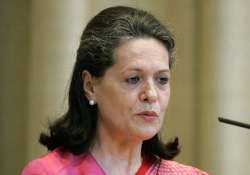BJP slams Sonia Gandhi on her criticism of Naga accord
New Delhi: BJP today slammed Congress chief Sonia Gandhi on her criticism of the Centre over the Naga accord, wondering whose interests her party was serving by not standing with the government on a national

New Delhi: BJP today slammed Congress chief Sonia Gandhi on her criticism of the Centre over the Naga accord, wondering whose interests her party was serving by not standing with the government on a national security issue.
Union Minister Nirmala Sitharaman cited initial statements by the Congress chief ministers of north east states welcoming the accord to hit back at the main opposiiton party and suggested that they had been asked to delete their tweets as the party wanted to attack the government.
"On political issues, you are opposing the government. On economic issues, you are opposing. Today on an issue of national security, you are opposing. Whose interest are you serving?
"Congress has reached the absolute nadir, absolute bottom in their obstructionist politics," she told reporters, hours after Gandhi attacked the government for not consulting the chief ministers of the region and accused it of arrogance.
Gandhi had said when she called her party's chief ministers of Manipur, Arunachal Pradesh and Assam, who are directly affected by the Naga accord, she found that they were "totally blank" on the issue.
Naga accord shows Modi government's arrogance, North East CMs not consulted: Sonia Gandhi
"Nobody has even bothered to brief them, perhaps not in detail, but in a wide sense. After all, our chief ministers are directly affected, be it Manipur, Arunachal Pradesh or Assam. So, what do I take from this? From this I take that this government is arrogant," she had told reporters.
Sitharaman said the Centre had called a meeting of all state chief ministers connected with the accord but those from Congress had chosen to boycott it.
Quoting tweets and statements of Assam and Arunachal chief ministers Tarun Gogoi and Nabam Tuki besides Congress MP Ninong Ering, the BJP leader said all of them "welcomed" the accord with Ering calling it historic.
What her party is hearing that Congress has chosen to ask all its leaders from north east not to welcome the accord and some have deleted their tweets and withdrawn their comments, she said.
Noting that Congress is the oldest party and had ruled the country for decades, Sitharam said its stand was "worrying" and it did not augur well for democracy.